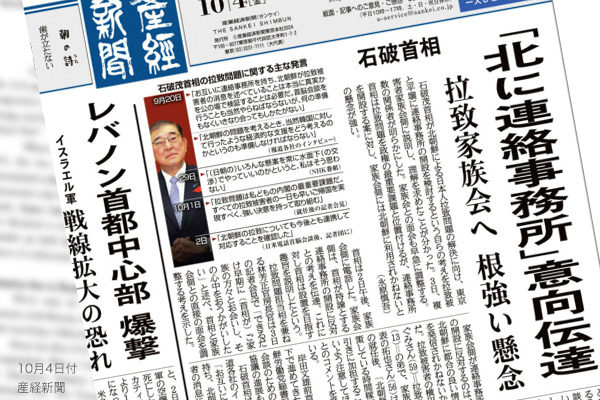The association of families of victims abducted by North Korea, chaired by Takuya Yokota, a brother of abductee Megumi Yokota, and its supporting organization led by me have opposed a proposal to establish liaison offices in Pyongyang and Tokyo, which Prime Minister Shigeru Ishiba advocated during the ruling Liberal Democratic Party’s leader election campaigns.
Reasons against the proposal are: (1) the establishment of liaison offices for investigating Japanese abductees would only allow North Korea to buy time as Pyongyang strictly controls all residents, including abductees, by requiring them to have citizenship cards, and (2) as North Korea imposes strict restrictions on movements of foreign diplomats whose embassies are in Pyongyang, it will be impossible for Japanese officials to approach the abductees even if a liaison office is established.
Inaccurate news report about Ishiba’s request
I believe that Ishiba should become reluctant to implement his pet idea of establishing liaison offices as he will read the history of behind-the-scenes negotiations between the two countries and the Japanese government-held information about the abductees as the new prime minister. When I received a phone call from Ishiba on October 2, therefore, I told him that I wanted him to be familiar with the process thus far.
On October 4, the Sankei Shimbun newspaper published a front-page article headlined “Ishiba informs the families association of a North Korea liaison office plan,” reporting that “Prime Minister Ishiba explained to the families association about his idea of considering establishing liaison offices in Tokyo and Pyongyang toward the resolution of the abduction issue and asked the association to understand the idea.”
The article was about Ishiba’s phone call to Yokota on October 2. In fact, however, the prime minister did not seek understanding from the association about the liaison office plan in that phone call. “The report that Ishiba persuaded the families association to accept a plan to establish liaison offices and a joint investigation committee is not accurate,” Yokota told a meeting held by my supporting organization on October 3. “When I received a phone call from the prime minister, I told him that the families association is not for the establishment.”
Concerns about promotion of pro-Pyongyang politicians
In his policy speech on April 4, Ishiba positioned the North Korean abduction issue as a “humanitarian issue” under “time constraints.” This represents a continuation of the Fumio Kishida administration’s policy of effectively separating the abduction issue from the nuclear/missile issue and resolving the abduction first within the framework of humanitarian issues. This is a reasonable policy based on the history so far. Ishiba also described the abduction as a “violation of national sovereignty.” He maintained the policy since the Shinzo Abe administration that the abduction is “the most important issue for the administration.” Ishiba made no mention of the liaison office proposal that is a matter of concern to us.
Regarding the phrase “returning to the origins of the Japan-North Korea Pyongyang Declaration” in the speech, some are concerned that the declaration does not contain the word “abduction.” The part of the declaration that Japan would normalize relations with North Korea and implement large-scale economic assistance after the resolution of the abduction and nuclear/missile issues, within the same framework as the one realized for South Korea, represents the carrot of the carrot and stick analogy. The Ishiba speech used the word “time constraints” to indicate that there is a time limit for North Korea to get the carrot: the abduction issue must be resolved while parents of abductees are alive. This indication is not different from the stance of the Kishida administration.
The question is whether the Ishiba administration will follow through on this policy speech. I feel nervous about Ishiba’s appointment as cabinet ministers of many members of a parliamentary league for promoting the normalization of Japan-North Korea relations.
Tsutomu Nishioka is a senior fellow and a Planning Committee member at the Japan Institute for National Fundamentals and a specially-appointed professor at Reitaku University. He covers South and North Koreas.


